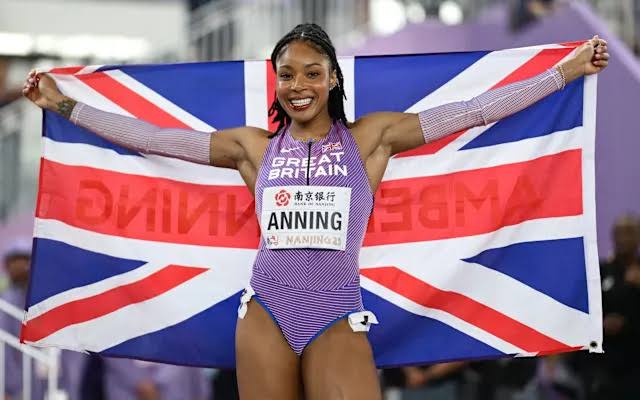
Britain’s latest 400m gold medallist on motivation, dealing with loss of former coach and overcoming fat-shaming as a US college fresher
Her stunning triumph marked a number of firsts. It was Anning’s first international title, in her first professional season after years grafting away on the American college scene, and she was Britain’s first-ever female winner in the event. The stars had truly aligned.
Two weeks earlier, Anning’s confidence had been shredded after she was disqualified from the heats at the European Indoor Championships in Apeldoorn for a lane infringement. Determined to avoid a repeat in Nanjing, she calmly recited a letter to herself before warming up.
“It was basically what I would say to the ‘old Amber’ and what I would say to her now,” says Anning. “I wrote about all the sacrifices I’d made, all the events I’d missed socially, moving over to America and not wanting to feel disappointment after all the hard work I’d put in, wanting to hear the national anthem standing on the podium and going out to get what’s mine.
“I wrote it at the Europeans but took the letter to the worlds and every time I read it, it put a smile on my face. It just reminded me that I had come so far and that I could go out there and achieve what I wanted to.”
Anning is speaking to Telegraph Sport from her United States training base in Arkansas, where she has returned to ready herself for the outdoor season. Unlike most emerging British talent, she made the bold decision to leave her Brighton-based family, aged 19, to make a track career for herself in the US. When she arrived at Louisiana State University on a scholarship in 2020, she was a small fish in a very big pond and began rubbing shoulders with some of the best 400m specialists in the world.
Anning initially struggled to grapple with the huge cultural shock, before body-image insecurities struck. She quickly came across what it meant to be labelled “Freshman 15” – the term is used to describe so-called weight-gain among college athletes in their first year, when they may put on up to 15 pounds.
“I wasn’t running very fast and I was struggling with weight,” reflects Anning. “The portions over here are really big and sometimes there’d be some points where I’d see myself in the mirror and just struggled with my look.
“I came to America looking really lean and really toned. When you’re 18, 19, you’re not developed as much in terms of lifting. During my first year, when I came back for Christmas, I don’t think my parents even recognised me.
“A lot of comments were going around. I remember the team, some girls made comments that I was fat and overweight. It was mentally hard. When you’re underperforming as well you’ve got all this stuff going on.”
In her award-winning memoir Good For A Girl, Lauren Fleshman, a former middle-distance national champion, painted her own damning experience of the American college system as one severely lacking in female coaches needed to promote healthy practices. “It can be hard to be a female sometimes,” says Anning. “We deal with a lot, and it’s about making sure that you have people around you who understand when you’re on your period, you’re not maybe going to be the best, like some people’s are heavier than others.”
Anning, though, insists her formative years in the States have been “pretty positive” and insists the cut-throat nature of her training environments is inherently tied to her success on the track. At her maiden Olympics in Paris last year, she collected a pair of relay bronzes and finished a respectable fifth in the women’s 400m final, but her career might have veered in a completely different direction after she experienced devastating loss as a teenager.
The sudden passing of Anning’s childhood coach, Lloyd Cowan, the esteemed trainer who masterminded Christine Ohuruogu’s 2008 Olympic success in Beijing, turned Anning’s world upside down.
Cowan coached Anning as a junior and such was the profound influence the former Commonwealth sprint hurdler had on her career that Anning’s mother helped set up the Lloyd Cowan Bursary as a way to honour his legacy after his unexpected death in 2021, which was believed to be related to Covid-19 complications. The initiative supports athletes who lack the financial means to stay in the sport.
“I was devastated,” says Anning. “I was in a lot of disbelief. Lloyd was just such a figure and role model to me and someone who I thought would be here on this journey with me today, especially seeing what he’d done with Christine Ohuruogu.
“Those first two years [after his passing] I’d get teary even talking about it because he had such a profound impact on me. He was just such a charismatic man who had so much love and joy. At the worlds, on the podium, I was thinking, ‘Lloyd, we got there! We can tick something off our list.’”
How proud he would have been of his diligent pupil, who will not be parting with her lucky letter any time soon. “It’s staying in my backpack for now,” smiles Anning.
Be the first to comment